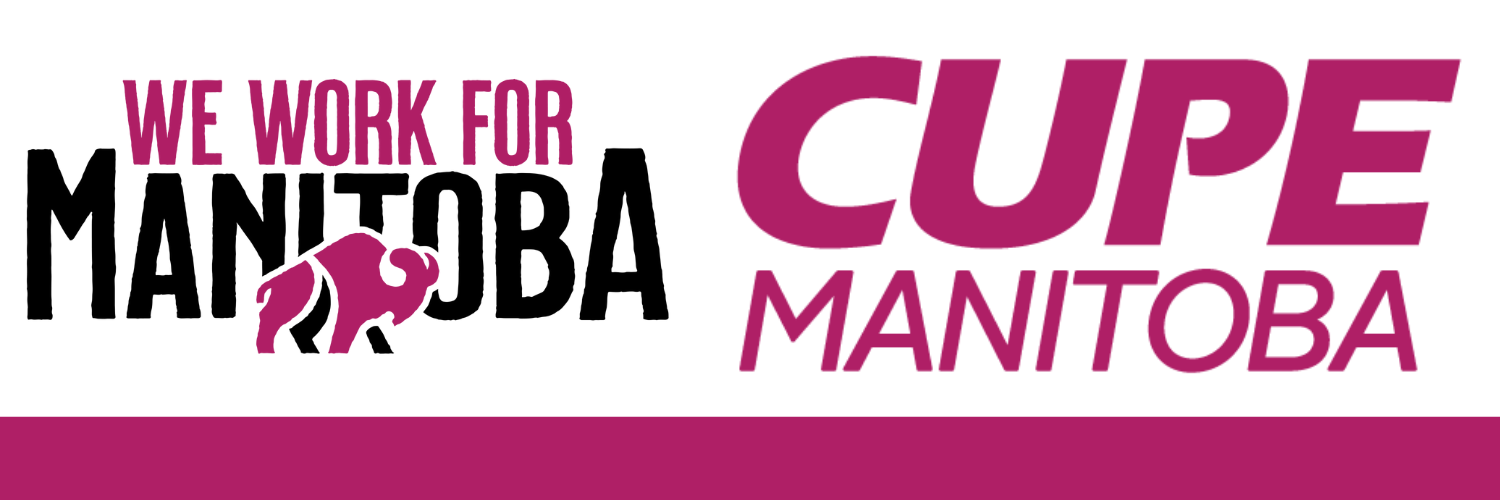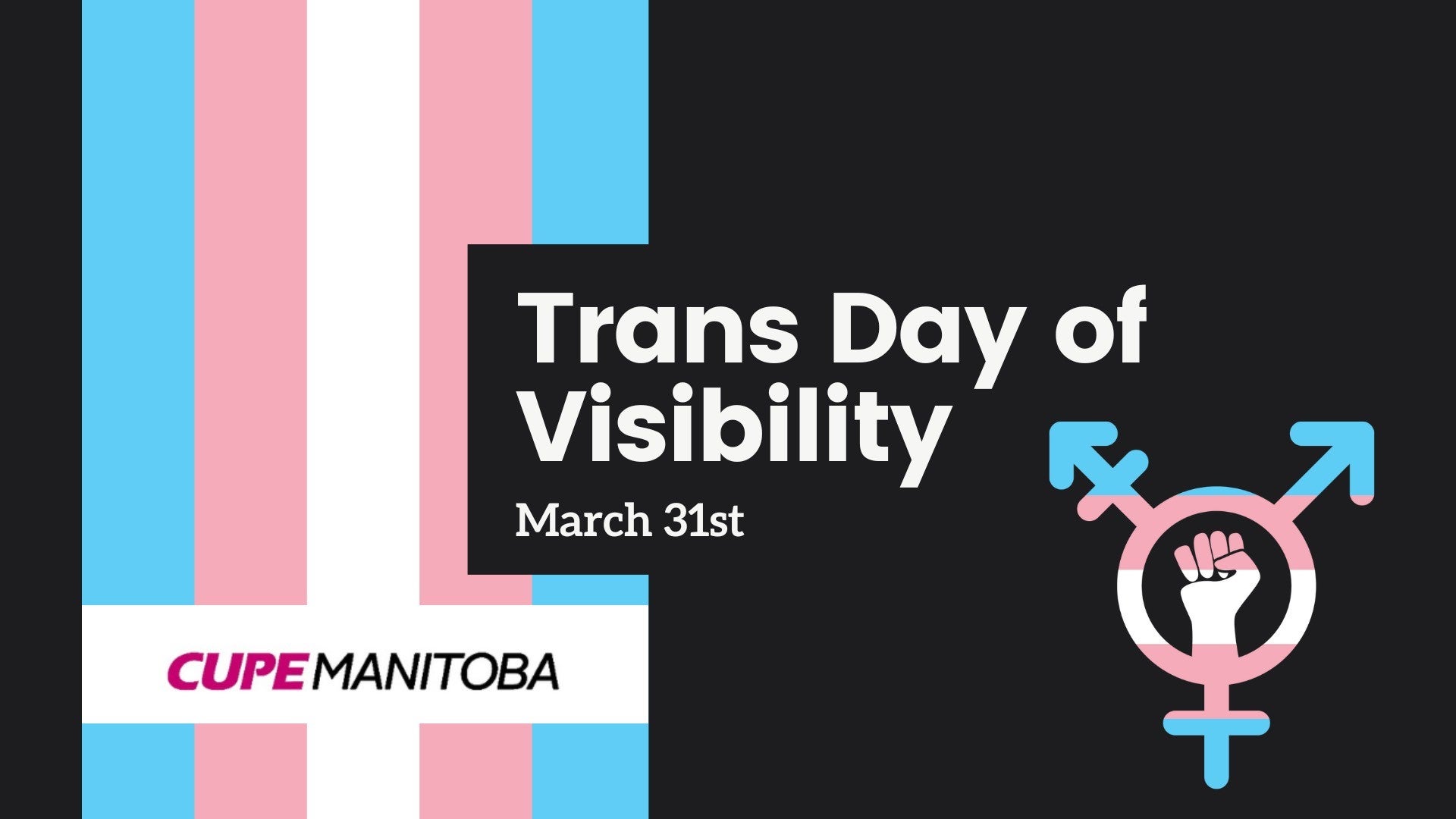A letter from Daniel Richards, 2SLGBTQI+ Diversity Representative – CUPE Manitoba
This Friday and every March 31st most of the world observes International Trans Day of Visibility. A day to celebrate trans people and raise awareness about the discrimination still faced by Transgender people worldwide.
In 1948 the United Nations proclaimed the Universal Declaration of Human Rights to set out fundamental human rights to be universally protected. The preamble opens with “Whereas recognition of the inherent dignity and of the equal and inalienable of all members of the human family is the foundation of freedom, justice and peace in the world.” And Article 1 states “All human beings are born free and equal in dignity and rights. They are endowed with reason and conscience and should act towards one another in a spirit of brotherhood.”
In Canada, the Canadian Charter of Rights and Freedoms was signed on April 17, 1982. Yet still today we see injustices, harassment, and discrimination against Transgender folks throughout the world. Inclusive health care and support services are not accessible to all and stigma, policies and practices often erode members the equal right to participate.
What will you do this year?
Maybe you want to share this poster with members, family and friends?
https://ccgsd-ccdgs.org/wp-content/uploads/2020/09/HowToAddressTGFolx.pdf
As an activist you may want to be better educated on how to be an ally to gender diverse folks see what our friends at the Sexuality Education Resource Centre have to say:
1. If you don’t know what pronouns to use, listen first. If you must ask which pronouns the person uses, start with your own. For example, “Hi, I’m Alex and I use the pronouns he and him. What about you?”
2. Be patient with a person who is questioning or exploring their gender identity. A person who is questioning or exploring their gender identity may take some time to figure out what’s true for them. They might, for example, use a name or pronoun, and then decide at a later time to change the name or pronoun again. Do your best to be respectful and use the name and pronoun requested.
3. Understand the differences between “coming out” as lesbian, gay, or bisexual and “coming out” as Transgender.
“Coming out” to other people as lesbian, gay, or bisexual is typically seen as revealing a truth that allows other people to know your authentic self. The LGB community places great importance and value on the idea of being “out” in order to be happy and whole. When a Transgender person has transitioned and is living their life as their authentic self–that istheir truth. Some people may choose to publicly discuss their gender history in an effort to raise awareness and make cultural change, but please don’t assume that it’s necessary for a Transgender person to disclose that they are Transgender in order to feel happy and whole.4. Be careful about confidentiality, disclosure, and “outing”. Some Transgender people feel comfortable disclosing their gender history, while others do not. A Transgender person’s gender history is personal information and it is up to them to share it with others. Do not casually share this information, speculate, or gossip about a person you know or think is Transgender. Not only is this an invasion of privacy, it also can have negative consequences in a world that is very intolerant of gender diversity. Transgender people can lose jobs, housing, friends, or even their lives when other people find out about their gender history.
Want to learn more? These tips are a few examples from a longer list in this article:
Tips for Allies of Transgender People | GLAAD
In April 2022 the Canadian Labour Congress released a report on violence and harassment in the workplace. In that we heard that 82% of survey respondents who identified as gender diverse reported experiencing harassment and violence at work and 73% reported the were sexually harassed.
As union activists and supporters of human rights we must ensure we are working to end discrimination against all members and that collective agreements enshrine the protections and needs of Transgender members.
Below is a guide on Bargaining Beyond the Binary to help you prepare for bargaining:
https://cupe.ca/sites/default/files/bargaining_trans_inclusion_gender_diversity_en.pdf
And here is an easy to read poster on pronouns and gender diversity that can be shared with membership so everyone can learn more and cause less harm:
https://cupe.ca/sites/cupe/files/pronouns_eng.pdf
And of course, as workplaces become safer for all workers the services provided will become safer for all community members. Here is a resource to help us all be better allies and shape the public spaces that everyone deserve and has Charter and Human Rights to enjoy:
https://cupe.ca/sites/cupe/files/public_services_for_lgbtq2_older_adults_6.0.pdf
Please do take the time to observe March 31-Trans Visibility Day and carry the work forward every day, all year.
Let us know your progress and how you celebrate!
In solidarity,
Daniel Richards
CUPE Manitoba Executive – 2SLGBTQI+ Diversity Representative

